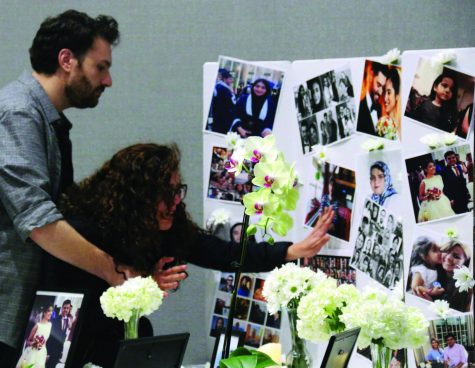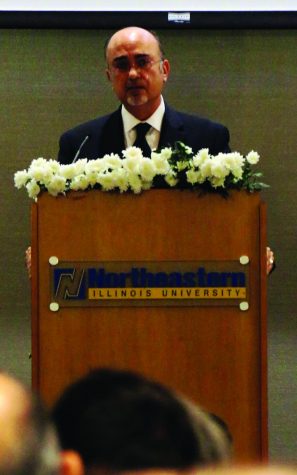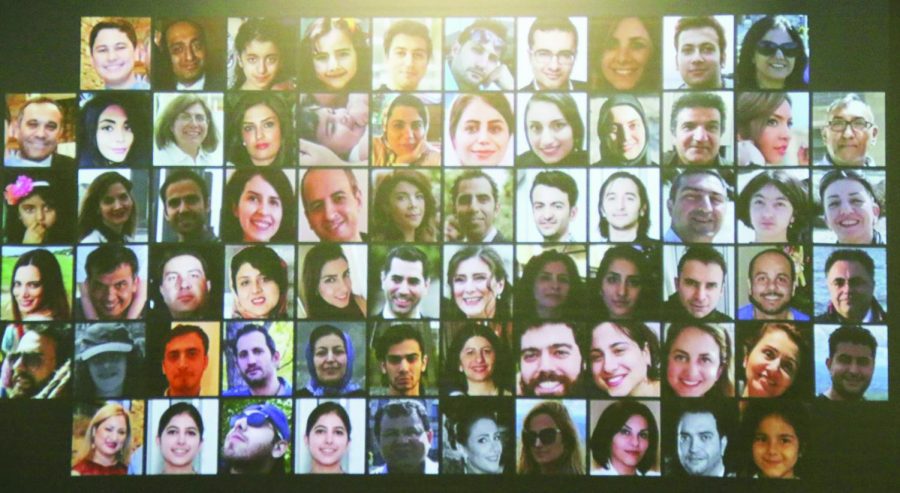NEIU holds vigil for the victims of Flight PS752
Photos of the passengers who boarded Ukrainian Flight PS752 were shown at the vigil along with their bios.
January 28, 2020
Northeastern Illinois University honored the 176 victims of Ukranian Flight PS752, shot down by the Iranian military on Jan. 8, with a public vigil inside Alumni Hall on Jan. 14. Hosted by Dr. Mateo Farzanah, history professor at NEIU and principal of the NEIU Mossadegh Initiative, the event refrained from political discourse in an effort to focus attention on remembering those who lost their lives.
Following the assassination of Qassem Soleimani earlier this month and the incident which claimed the lives of the passengers on Flight PS752, Iran has been a hotbed for controversy. But NEIU and its community came together as one. During the vigil, NEIU honored the victims by displaying their pictures, names and short bios on a large projected screen. A table of remembrance was also provided, with pictures of the passengers whose aspirations suddenly came to a halt at the moment of their airplane crash. The table had candles and flowers spread throughout while visitors continued to pay their respect to the photographs of the victims. Many of the victims were visiting family during the holidays, a mix of various citizenships such as Canadians, Iranians and Britons.
Dr. Farzaneh’s expertise regarding the history of Iran, the Middle East and Islamic civilization has been celebrated both during his 10-year tenure at NEIU and through his involvement in the Chicago-Iranian community and the Mossadegh Initiative.

The vigil was the only one in the state and was hosted by NEIU’s Mossadegh Initiative
Even though the incident happened abroad, the attack resonated for many in Chicago. “It could’ve been us,” says Dr. Farzaneh during the vigil, “But it doesn’t matter, we are all a part of that plane, a little part of us died.”
Due to the sensitive nature of the current political climate in Iran and the status of some of the students that spoke at the vigil, participants opted out of being named in the article.
One mourner recited an emotional speech, paying her respect to her cousin who was among the deceased. Another also lost family and friends. It was a mix of obituaries and speeches, both in English and Persian language, but every speaker made a point to say that the event was not meant for any political discussions.
The week following the event, the NEIU Independent sat down with Farzanah to discuss the rise of US-Iranian tensions and the vigil.
Independent: How important is the Iranian culture, specifically to the youth here? Are there any misunderstandings during this conflict?
Dr. Farzaneh: Iranian culture is very important to us, it is what we practice at home. I have been here for 36 years. Iranian culture has a lot of positive contributions to world civilization that people should know about. My culture is a part of my professional life. We have pride in our background, and what I try to do is correct the misconceptions or misunderstandings that people have.
There was a lot of misunderstandings with Iraqis when the Iraqi War happened. People did not know what language they spoke, issues or where it is.
If you get to know a culture, it is harder to drop a bomb on them. If we highlight humanity, there is no way people would want to destroy it. So that is where we see American media vilify our culture. Iranians demonstrate that this is far from the truth, that is shown in the way they present their arts, music, films, fields of technology and contributions to American society. Lots of times, governments don’t want people to know the truth.
The idea of tolerance and inclusion, specifically the idea of multiethnic, multilingual and multicultural actually started in the middle east by heritage, but unfortunately that does not get highlighted. Iran consists of many ethnicities and religions such as Azeris, Kurds, Arabs and Baluchis, and Islam, Judaism, Christianity and Bahai.
Independent: Do you have family back home?

Dr. Mateo Farzanah was one of
the organizers of the event.
Dr. Farzaneh: Sure, I have family there, my wife has family there. We travel frequently there with our child.
Independent: Was NEIU the only vigil you attended?
Dr. Farzaneh: The only vigil was here at Northeastern Illinois University, none other than that in the state of Illinois. I sponsored it through the Mossadegh Initiative and provided the coordination it needed. But the organization by far was done by students from UIC, Northwestern and IIT. They have several hundred Iranian students, faculty and associate deans.
“I am proud that we did it, and it turned out very nicely,” said Farzaneh as he concluded the post-vigil interview with the Independent.
This was despite the disturbance that occurred at the end of the vigil that evening, when a few men began shouting at Farzaneh soon after he made the closing remarks.
One of them was a man who arrived late for the vigil and stood by the doorway until the very end when he began yelling towards the stage from afar, “Shame on you! Shame on you!”
He was accompanied by two other men whom likewise said the same to the crowd of mourners. The men were angry that nobody wanted to “talk about the elephant in the room” referring to the “terrorist government of Iran.”
Farzaneh remained calm, as did the crowd who mostly seemed emotionally exhausted from the event. Others chose to stay during the yelling and were instead at the opposite end of Alumni Hall.
There, people continued to mourn and pay their respect at the table. A woman, one of the speakers that evening, hung to the board where her deceased family members were pictured and strongly wept as her companion held her up.
Some individuals in the crowd told the men not to yell at the people who were only there to mourn the deaths of their loved ones and pay respect to the community that they all belonged to.
Eventually, NEIU PD officers came in to ask everyone to exit the venue. While a few of them remained huddled outside at the Student Union, the same men began yelling again and resparked the disturbance. At that point, the Chicago PD was called in to usher everyone out.
Despite the arguments at the end, it was a beautiful and meaningful vigil for those who lost their lives from the airplane crash of Ukranian Flight PS752.
The Mossadegh Initiative at NEIU allows people to get involved with and learn about Iranian culture.
More about the Mossadegh Initiative: Currently, through the endowment that made the Mossadegh Servant Leadership Hall naming possible, the University offers at least two scholarships annually through the College of Business and Management and one scholarship through the College of Arts and Sciences. The scholarships are competitive and the criteria mandate a demonstrated understanding of Dr. Mossadegh’s life and service to Iran, a high GPA and financial need. Every student can apply with preference given to Iranian heritage students.








